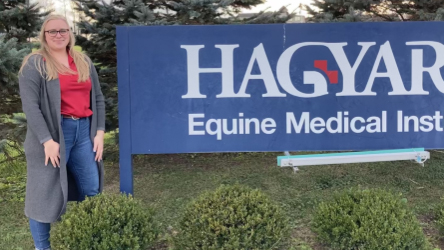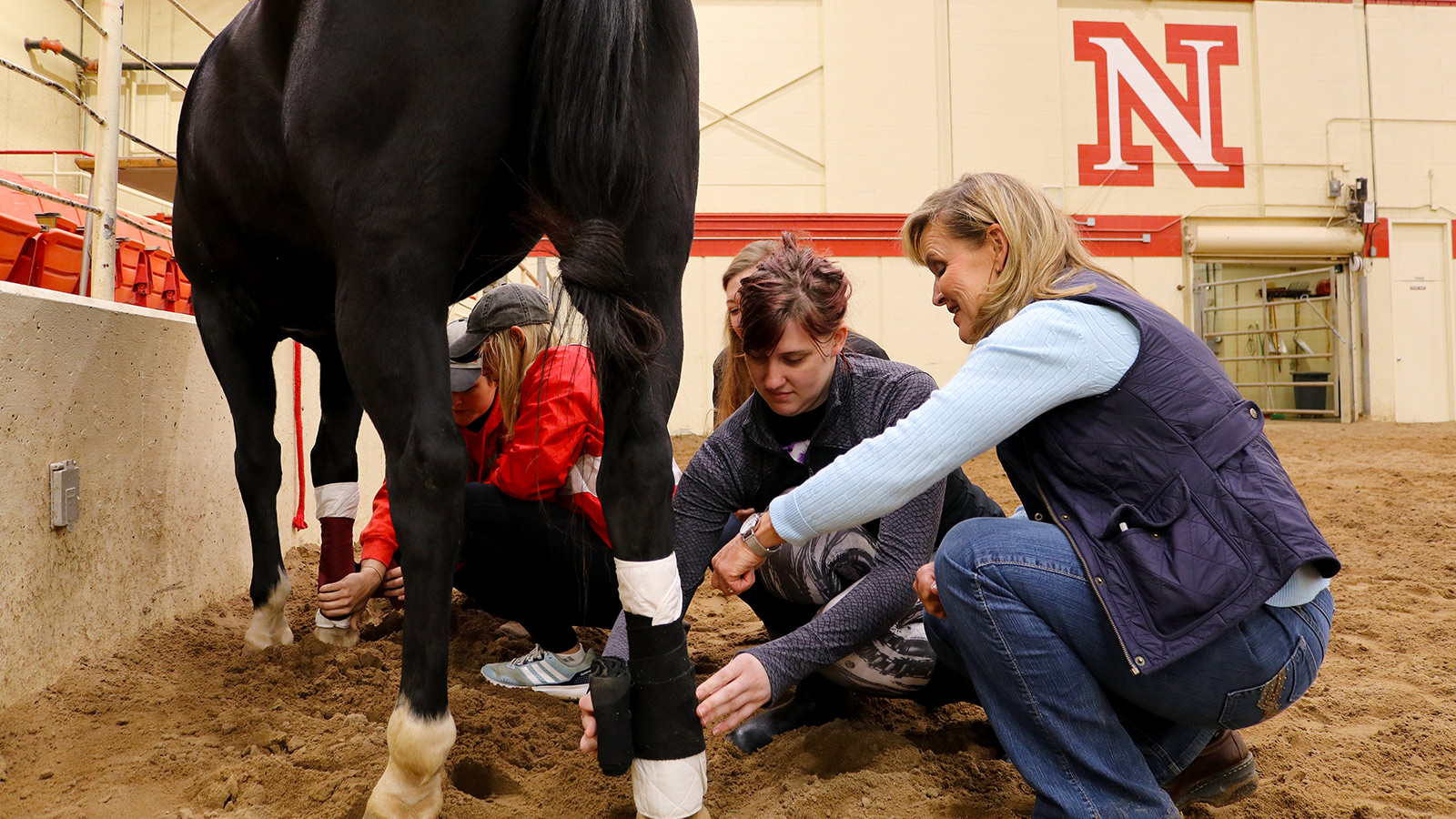The companion animal and equine minor provides an overview of critical areas of companion animal and equine skills applicable to other career paths. The minor increases your knowledge and marketability in the companion animal and equine fields while giving you a well-rounded collegiate experience that creates more connections and expands networking opportunities.
This minor will be open to any UNL undergraduates who are not Animal Science majors. Obtain your minor by completing 18 hours of equine and companion animal courses.

My degree from UNL is a Bachelor's of Science in Agricultural Economics with a minor in Animal Science equine emphasis and I currently work at Hagyard Equine Medical Institute in Lexington, KY. I use my minor almost every day in my work when admitting emergencies from field and ambulatory doctors to the clinic. Referring doctors have varying processes of relaying information. When they call, having a strong understanding of anatomy and a basic understanding of medical care, helps me compress that information into a format my doctors and fellows are wanting to receive.
Overall, I enjoyed how well rounded my education was. While my minor was focused on equine studies, I also learned about other animals and their care. I would strongly recommend a minor in equine science for anyone interested in the business side of the equine industry. You will be far more valuable as an employee when you have some understanding of the service being provided.
-- Valerie Skaalrud, 2019
What You'll Learn
The courses in the Companion Animal and Equine Science Minor will develop the following skills:
- Apply handling and training skills related to companion animals and/or horses.
- Develop animal nutrition, growth, reproduction, behavior, and management recommendations related to companion animal and/or equine science.
- Develop a unique network with leaders in the beef industry.
- Develop skills to evaluate companion animals and horses.
- Propose solutions to problems in the companion animal and/or equine science fields.
18
Credit Hour Minor
20
Courses To Choose From
What Courses Will You Take?
Students must complete a minimum of 18 hours in Companion Animal and Equine Courses. A minimum of 8 should be at the 300-level or above.
*NOTE: Some courses have prerequisites that may not be included in the minor. Students should work with the instructor to determine if they are prepared to take courses without the prerequisites or if they need to choose a different course option.
Course Descriptions
Required Courses (Credit hours):
ASCI 171: Human-Companion Animal Interactions (2) -OR- ASCI 260: Basic Equitation (2)
(171) Roles of companion animals in society (therapy, research, and entertainment). The responsibilities of humans in these relationships.
Instructor: Lisa Karr
-OR-
(260) Study and application of basic equitation principles for the novice rider. Review of fundamental horse safety and horsemanship to include handling, grooming, equipping, riding western or English, and the relationship of riding to physical and mental well-being. Development of balanced seat, hands and posture at all the natural gaits of the horse. Emphasis will be on control of the horse through the use of the primary and secondary aids. Welfare and communication considerations in order to have effective horse-human relationships.
Instructor: Lena Luck
ASCI 251: Introduction to Companion Animals (3) -OR- ASCI 252: Introduction to the Horse Industry and Management (3)
(251) Overview of pets, their care, nutrition, reproduction behavior, and health issues; exploration of other ways in which these animals can be used (e.g., in therapy, teaching).
Instructor: Lisa Karr, Trent Shrader
-OR-
(252) Provides an introduction to the equine industry including history and basic biology of the horse, proper care and acceptable management procedures, and current issues. An overview of basic equine anatomy and physiology will be discussed as it relates to managerial principles associated with proper hoof care, disease prevention, breeding and genetics, nutritional management, reproduction, and animal welfare.
Instructor: Lena Luck
ASCI 271: Companion Animal and Equine Behavior (3)
Companion animal and equine behavior. Application of behavior principles to describe normal and problem behaviors of common companion animals and horses.
Instructor: Lisa Karr, Trent Shrader
ASCI 320: Animal Nutrition (3) -OR- ASCI 321: Companion Animal Nutrition (3) -OR- ASCI 322: Equine Nutrition (2)
(320) Fundamentals of nutrition and feeding of domestic livestock, nutrients and nutrient requirements, characteristics of feedstuffs, methods of feeding, and the feed industry.
Instructor: Phil Miller
- OR-
(321) Digestive anatomy and physiology of companion animals including dogs, cats, small mammals, and exotic species. Unique nutrient requirements, pet food formulation, and regulations.
Instructor: Lisa Karr
-OR-
(322) Equine nutrition including digestive anatomy and physiology. Nutritional requirements of horses as related to growth, reproduction, and performance. The relationship of nutrition to disease and environment. Management practices and application of current equine nutritional research.
Instructor: Kathleen Anderson
Choose 7-8 additional hours:
ASCI 240: Anatomy and Physiology of Domestic Animals (4) -OR- ASCI 340: Animal Physiological Systems (4)
(240) Fundamentals of the anatomy and physiology of domestic animals.
Instructor: Ty Schmidt
-OR-
(340) A comprehensive look at the major physiological systems that comprise the mammalian body. Anatomical organization and functionality of the nervous system, muscle, cardiovascular system, respiratory system, digestive system, urinary system, reproductive system, endocrine system, and immune system. Labs offer hands-on learning experiences through dissections, clinical demonstrations, and interactive multimedia.
Instructor: Dustin Yates
ASCI 300E: Principles of Horse Evaluation and Judging (2)
Conformation associated with equine structural form and performance standards. Evaluation of performance classes as governed by breed association standards and industry regulations. Presentation of oral reasons to defend selection decisions.
Instructor: Kathleen Anderson
ASCI 311A: Horse Industry Study Tour (2)
Study tour of livestock and/or meat/food processors. Provide an understanding of the industry's operations and problems.
Instructor: Kathleen Anderson
ASCI 342: Equine Reproduction (2)
Anatomy and physiology of stallion and mare reproductive systems. Estrous detection systems, artificial and natural breeding techniques, infertility, semen collection and processing, reproductive management, and record keeping.
Instructor: Kathleen Anderson
ASCI 360: Advanced Equitation (2)
Study and application of maneuvers basic to performance excellence. Assigned student mounts expected to show satisfactory progress toward standards of excellence in Western and English performance.
Instructor: Lori Jaixen
ASCI 370: Animal Welfare (3)
In-depth exploration of the issues involved in animal use. The historical, biological, ethical, and social aspects of human/animal interactions in Western culture.
Instructor: Ruth Woiwode
ASCI 450: Horse Management (3)
Light horse production. Nutrition, reproduction, management, housing, and principle usage of light horses.
Instructor: Kathleen Anderson
ASCI 496: Independent Study in Animal Science - Equine and Canine Exercise Science (3)
Individual or group projects in research, literature review, or extension of course work under the supervision and evaluation of a departmental faculty member.
Instructor: Lisa Karr, Tom Burkey, Lena Luck
ASCI 399: Independent Study in Animal Science - Exploring Companion Animal Nonprofits and Business (1)
Individual or group projects in research, literature review, or extension of course work under supervision and evaluation of a departmental faculty member.
Instructor: Lisa Karr
ASCI 399: Independent Study in Animal Science - Dog Training and Behavior Laboratory (2)
Individual or group projects in research, literature review, or extension of course work under supervision and evaluation of a departmental faculty member.
Instructor: Lisa Karr
PSYC 461: Animal Learning and Cognition (3)
Evaluation and discussion of studies in learning and cognition that draws from the research literature with nonhuman animals.
Instructor: Ken Wakabayashi
Companion Animal and Equine Faculty and Advisors
How to declare the minor?
Students would work with their academic advisor or their college's advising center to declare the Companion Animal and Equine Science Minor.


